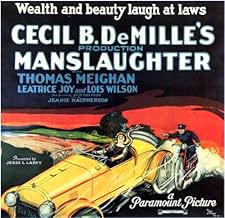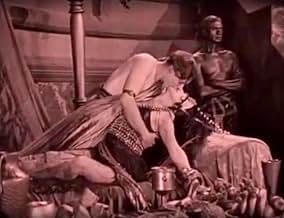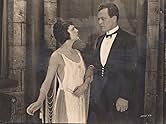Thrill-seeking society girl Lydia causes a motorcycle policeman's death and is prosecuted by her fiancé Daniel, who describes in lurid detail the downfall of Rome. While she's in prison, she... Read allThrill-seeking society girl Lydia causes a motorcycle policeman's death and is prosecuted by her fiancé Daniel, who describes in lurid detail the downfall of Rome. While she's in prison, she reforms and Daniel becomes a wasted alcoholic.Thrill-seeking society girl Lydia causes a motorcycle policeman's death and is prosecuted by her fiancé Daniel, who describes in lurid detail the downfall of Rome. While she's in prison, she reforms and Daniel becomes a wasted alcoholic.
- Director
- Writers
- Stars
- Awards
- 1 win total
- Dicky Evans
- (as Mickey Moore)
- Director
- Writers
- All cast & crew
- Production, box office & more at IMDbPro
Featured reviews
As one intertitle says early on: "Modern girls don't sit by the fire and KNIT." And so the leading character, played with great verve by Leatrice Joy (unknown to me), races, literally, to a huge dilemma. A man is killed, and a district attorney falls in love with the wrong woman. There are parties, and some hugely extravagant (for the time) scenes that director DeMille loved to stage. It's all kind of fun and the drama relatively dramatic. But none of it rises above. The conflicts are a bit drained of actual tension (partly the acting, partly the script) and the overall flow is surprisingly slow. The fun parts sometimes seem like interludes that may have once held their own, but no longer (and maybe not then, either).
I expected more, which is always a problem, but if you want to get into early DeMille, before he turned into a blockbuster hack, there are at least 10 other films I've seen (actually) that are much better. (Look for almost any drama between 1918 and 1921, a really fertile period for him and his loyal cinematographer, Alvin Wycoff.) As for the title, there might have been a great double entendré there, with both the man killed and the man in love, but it never quite gels.
But let's first take a look at how DeMille's formal style is at work here. It's a style he perfected early on in his career and which he never lost no matter how ridiculous his pictures became. What stands out most about Manslaughter is its incredibly precise pacing of the action, with each scene having its own rhythm. We open with a dynamic burst of quick cutting and constant motion. Things become more complex in the following party scene, with the movements of different characters in consecutive shots mimicking each other rhythmically to keep a continuous pace. DeMille uses similar techniques to step up the pulse of the picture within a single sequence. For example in the central court scene there is a quick shot of all the spectators rising to their feet, followed by the shot in which the Drummond's mother tears off Leatrice Joy's veil, the first shot giving impetus to the second. DeMille also makes strong use of space and lighting to give an emotional tone to each moment.
DeMille is unusual among directors with such a showy visual style, in that he always aims, through framing and lighting, to focus us on the actors. And like everything in DeMille's cinema, the performances tend to tread the line between naturalism and theatricality. Unfortunately Leatrice Joy is a little average, especially when compared to Gloria Swanson who had just completed a successful run of pictures with DeMille. Thomas Meighan too is a bit below par, his performance only being good in the meagre context that he is playing a stony-faced killjoy. Nevertheless the language of gesture and expression, always important in DeMille's pictures, adequately conveys their characters' intentions. This effect is spoiled only by the lengthy and over-abundant title cards. Having said that, you've got to love Jeanie Macpherson's way with words, with such gems as "Doesn't this doughnut remind you of a life preserver?" The storyline is of the highest grade DeMille-Macpherson moralist nonsense. It begins by railing against such scandalous transgressions as female boxing and pogo-stick racing, then follows up by making the point that such goings-on can be a gateway to even greater sins, such as accidentally killing a traffic cop. This daft righteousness is all pretty harmless, but what really makes Manslaughter a difficult story to relate to is the implausible motivations of its characters, in particular Thomas Meighan's. It seems bizarre that someone so uptight would even show his face at a jazz 'n' liquor party in the first place, let alone fall in love with one of the flappers "for what she might have been". Unless it's purely a sexual thing, like the minister in Sadie Thompson, but this is never implied and wouldn't really fit any better with the story arc.
It's no wonder that DeMille would soon begin making his points with large-scale spectacles. The stories he was now handling were too silly to have any real dramatic weight, and the most engaging moments of Manslaughter are the frenzied flashbacks of a decadent Rome. It also looks as if those were the scenes DeMille had the most fun staging. As it is, Manslaughter is a decidedly mediocre effort, nicely directed but with the wrong material for small-scale drama.
Leatrice Joy plays Lydia, a reckless playgirl, and Thomas Meighan plays O'Bannon, a principled district attorney. Lois Wilson adds support as Joy's maid, Evans, who steals Lydia's ring to pay for her son's medical bills. O'Bannon, who is in love with Lydia, prosecutes Evans, although Lydia promises to appear in court on her behalf. Instead, Lydia forgets all about her maid languishing in jail and awaiting trial, gets drunk, and has a hangover the day of Evans' trial. Evans is sent to prison. As Lydia is roaring down the street in her car (over 60 mph!!!), a habit of hers, a motorcycle cop pursues her (there is a subplot here, but not worth mentioning). Anyhow, the cop smacks into her car, and Lydia is charged with manslaughter. O'Bannon, thoroughly angry at Lydia by now, prosecutes her, and all of Lydia's legal tricks do not provide an escape from a prison sentence. Now Evans runs into Lydia in prison and Lydia continues to try and order Evans about like a maid! Evans has an appropriate reaction. But soon, Evans sees "the light", and so does Lydia. O'Bannon, distraught over sending his true love to jail, starts hitting the bottle. Will DeMille go for a happy ending? The acting is pretty good, and certainly less hammy than you would see in a typical DeMille flick.
Writer Jeanie Macpherson got onto a racetrack with a professional race car driver to experience what it would be like to drive at high speed (they hit over 100 mph), but it was Leatrice Joy who was stuck actually driving the car with the safety of the cameramen depending on her driving skills.
There is one weird aspect of this film, and that is the Roman orgy scene. This "flashback" occurs while O'Bannon is summing up his case against Joy. The scene is complete with tigers, gladiators, people prancing around in weird outfits, and, if my eyes did not deceive me, two women making out. Later, there is another "flashback," with Meighan in some weird barbarian garb dragging Joy up some steps with a whip around her hands. Apparently this was DeMille's way of saying the country was going to hell in a hand cart.
De Mille had gotten in trouble with what little film censorship existed in his earliest films for showing sexy drunken scenes, so he changed his formula to show the sexy drunken orgy scenes as some kind of moral comparison with a Biblical lesson and got away with it. At least until the actual production code came into force in 1934.
This film was remade as a talking film in 1930 with Claudette Colbert as Lydia with basically the same plot, but with no orgies this time. That wasn't really director George Abbott's cup of tea.
Bacchannalian parties, which alternate between present and ancient Roman debauches, is a sure sign Cecil B. DeMille is directing. The O'Bannon character's flashbacks to ancient Rome are ludicrous DeMille indulgences. The better indulgence is the generous time DeMille's camera spends in a prison for women; his female prisoners are a lively bunch! The performances are sometimes entertaining, especially Joy and Wilson. Meighan starts off slow, but eventually succumbs to degradation. While fun is spots, this is NOT a great film. The love between Meighan and Joy is not particularly convincing; he shows more interest in Wilson, and might have been wise to run off with her. The story is sometimes inexplicable.
Symbolism likens a doughnut to a life preserver - so, why not a wheel? Coin collectors might enjoy the change in Meighan's pocket when he's down and out - two buffalo nickels and a standing liberty quarter.
***** Manslaughter (1922) Cecil B. DeMille ~ Thomas Meighan, Leatrice Joy, Lois Wilson
Did you know
- TriviaIn order to correctly write a script that would depict the experience of a woman being arrested and imprisoned, screenwriter Jeanie Macpherson arranged, at Cecil B. DeMille's behest, to be imprisoned for stealing a fur piece from a friend (with whom she had worked out an agreement beforehand). She was arrested in Detroit, booked and fingerprinted under the name Angie Brown and spent three days in jail before a police official discovered the truth and arranged for her release. Macpherson wrote about the experience in an article called I Have Been in Hell.
- Quotes
Lydia's Chaperon: Make Dan keep an eye on her, Eleanor. If she will show up for anybody, she will for him - but as her chaperon, I won't stay and be party to such goings on!
- ConnectionsFeatured in The Love Goddesses (1965)
Details
Box office
- Budget
- $385,000 (estimated)
- Runtime
- 1h 40m(100 min)
- Color
- Sound mix
- Aspect ratio
- 1.33 : 1






































